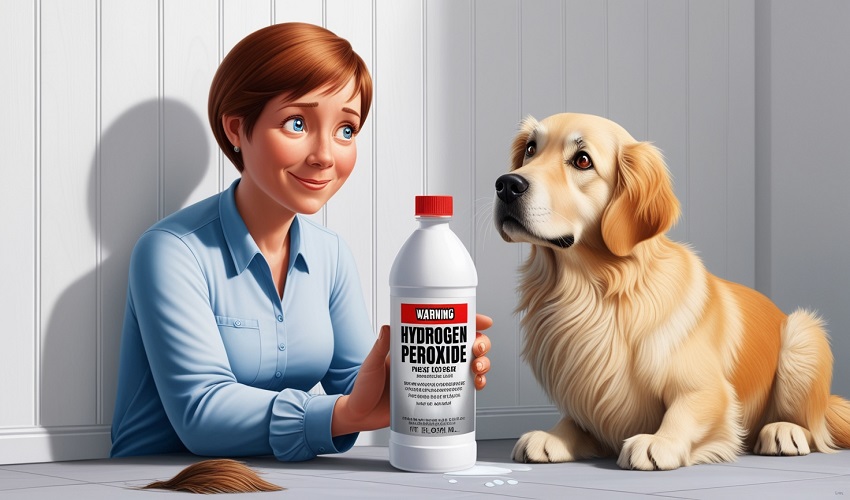Often used as a first-aid treatment, hydrogen peroxide helps dogs throw up after consuming some harmful substances. Despite its potential efficacy in eliminating toxic substances from a dog’s stomach, veterinary professionals disagree about its safety. Although using hydrogen peroxide in modest amounts on dogs may be relatively safe, there are hazards involved. The lining of the stomach, esophagus, and mouth can become irritated and damaged by excessive consumption or overuse. Furthermore, strong vomiting brought on by hydrogen peroxide may result in stomach contents being aspirated into the lungs, a potentially fatal consequence that includes pneumonia. Consequently, it’s imperative that you speak with a veterinarian and heed their advice before giving your dog hydrogen peroxide.
What is Hydrogen Peroxide?
Two hydrogen and two oxygen atoms combine to form the chemical molecule hydrogen peroxide (H2O2). It is a colorless, transparent liquid with potent oxidizing abilities. Because hydrogen peroxide can destroy bacteria, viruses, and fungi, it is frequently used as an antiseptic and disinfectant. It is also used in a number of industrial processes, including wastewater treatment and textile bleaching. Hydrogen peroxide is used in medicine to treat wounds and as an ingredient in some mouthwashes. It can also be used as a whitening agent for hair and as a household cleaning for surfaces.
When to Safely Use Hydrogen Peroxide on Dogs
Under the supervision of a veterinarian, dogs can safely be treated with hydrogen peroxide in some circumstances, such as when they have consumed certain poisonous chemicals and need to induce vomiting. To prevent possible danger, it’s imperative to utilize it only as instructed by a specialist. Hydrogen peroxide can also be used to clean small canine wounds, aiding in the removal of debris and disinfection. But, it’s crucial to correctly dilute it and refrain from applying it unsupervised to deep or severe wounds. To ensure the safe and proper administration of hydrogen peroxide on your dog, always seek the advice of a veterinarian.
Is it Harmful for a Dog to Ingest Hydrogen Peroxide?
Dogs may experience negative effects from ingesting hydrogen peroxide, particularly when consuming large amounts or concentrated forms. While it can occasionally be administered improperly and cause discomfort and damage to the gastrointestinal tract, it is often used under veterinarian guidance to induce vomiting after ingesting specific toxins. Vomiting and irritation of the mouth, throat, and stomach lining are two possible side effects of hydrogen peroxide. Furthermore, consuming a lot of hydrogen peroxide can cause the stomach to produce oxygen gas, which can result in bloating and even fatal consequences. Hydrogen peroxide should thus only be administered to dogs under the guidance of a veterinarian and in accordance with their advice.
Is It Safe to Put Hydrogen Peroxide On A Dog Wound?
Hydrogen peroxide is generally safe to apply to a dog’s wound, but it should be done carefully and under a veterinarian’s supervision. By eliminating bacteria and debris from wounds, hydrogen peroxide can help them heal more quickly. Hydrogen peroxide, however, must first be diluted with water before being applied to the wound because using it at full power can be too strong and may injure surrounding tissue. Hydrogen peroxide overuse can also irritate the skin and slow down the healing process. For this reason, it’s advisable to speak with a veterinarian to figure out the best course of action and application technique for your dog’s wound.
Is Hydrogen Peroxide Safe for Dogs to Induce Vomiting?
In some cases, using hydrogen peroxide to make dogs throw up can be safe and successful, but it needs to be done under a veterinarian’s supervision. Toxins swallowed by a dog can be eliminated from their stomach with the use of hydrogen peroxide, but in order to prevent any problems, the dosage and concentration must be closely monitored. Furthermore, there are certain medications for which inducing vomiting is safe, as well as certain window of time during which it works. Therefore, in order to guarantee that the treatment is carried out properly and appropriately, it’s imperative that you speak with a veterinarian before attempting to induce vomiting in your dog and that you closely follow their recommendations.
Can Hydrogen Peroxide be Used on Dogs? Veterinary Safety Assessment
Dogs can receive hydrogen peroxide for a variety of reasons, but the safety of the treatment depends on the circumstances and the method utilized. This is an evaluation of veterinarian safety:
Wound Cleaning
Dogs’ small wounds can be cleaned with hydrogen peroxide. It aids the healing process by clearing debris and disinfecting the region. But before using it, make sure to adequately dilute it with water to avoid irritation and tissue damage.
Inducing Vomiting
Veterinarians may advise using hydrogen peroxide to make dogs throw up when they have consumed poisons. To guarantee that the right dosage and method are applied, this should only be carried out under veterinary monitoring and direction.
Ear Cleaning
Dog ears can be cleaned with hydrogen peroxide, but once more, the solution needs to be diluted carefully to prevent irritation or harm to the sensitive ear canal.
Mouthwash
For dogs, some vets might suggest using hydrogen peroxide as a mouthwash to help keep teeth clean and reduce plaque. Nonetheless, it needs to be applied sparingly and diluted appropriately to avoid irritating the mucous membranes and gums.
even if hydrogen peroxide has many uses, it is crucial to use it carefully and under veterinary supervision to protect the dog’s health and safety. Before giving your dog hydrogen peroxide or any other treatment, always get advice from a veterinarian.
Reasons to Avoid Hydrogen Peroxide for Inducing Vomiting in Dogs
Risk of Aspiration:
Strong vomiting brought on by hydrogen peroxide increases the possibility of stomach contents aspirating into the lungs. Severe respiratory problems may arise from aspiration pneumonia.
Tissue Irritation:
The gastrointestinal system, which includes the mouth, throat, esophagus, and stomach lining, can get irritated by hydrogen peroxide. This irritation has the potential to worsen any toxicity-related harm already present..
Ineffective for Certain Toxins:
Not all drugs can be efficiently ejected by making someone throw up. Hydrogen peroxide may not always be able to completely flush the stomach of the toxins that have been consumed.
Potential for Overdose:
Hydrogen peroxide overdose can result from incorrect dosage or delivery, significantly complicating the dog’s health.
Delayed Veterinary Care:
If you only use hydrogen peroxide to make your pet throw up, you might put off getting veterinarian care, which is necessary for an accurate diagnosis and treatment of ingested poisons.
Alternative Methods:
Veterinary clinics can efficiently handle cases of swallowed poisons by employing safer and more regulated techniques, like the use of pharmaceuticals or activated charcoal.
All things considered, even though hydrogen peroxide might work in some circumstances, using it to make dogs throw up is not advised unless directed by a veterinarian. Speaking with a veterinarian guarantees that dogs’ ingested toxins are safely managed.
Hydrogen peroxide vs Apo morphine
Hydrogen Peroxide for Inducing Vomiting
When dogs consume particular toxins, it’s usual practice to induce vomiting in them using hydrogen peroxide. It works by causing irritation to the lining of the stomach, which sets off the natural instinct to throw up and pass the food.
Apo Morphine for Vomiting Induction
Veterinarians use a drug called Apo morphine to make dogs throw up. It functions by inducing the vomiting center of the brain, which causes the stomach’s contents to be expelled. Apo morphine is usually injected into the patient to induce vomiting quickly and precisely.
Comparison
Both hydrogen peroxide and Apo morphine can be used to induce vomiting, however Apo morphine provides better regulated and consistent effects, especially when given under veterinarian care. However, in some circumstances where Apo morphine is not available or is not advised, hydrogen peroxide may be utilized.
Frequently Asked Questions
Is hydrogen peroxide safe for dogs?
When used correctly, hydrogen peroxide can be safe for dogs; nevertheless, it’s crucial to adhere to prescribed dosage amounts and see a veterinarian before doing so..
When should I use hydrogen peroxide for my dog?
Hydrogen peroxide is frequently used to make dogs throw up after consuming specific poisons or materials. But it should only be applied with a veterinarian’s supervision.
How do I administer hydrogen peroxide to my dog?
The size, weight, and purpose of use of the dog can all affect the recommended dosage and mode of administration. It’s imperative that you speak with your veterinarian before giving your dog hydrogen peroxide.
Can I use any type of hydrogen peroxide for my dog?
It is imperative to utilize a 3% hydrogen peroxide solution, which is commonly available at pharmacies. Higher quantities may not be good for your dog.
What are the risks of using hydrogen peroxide on dogs?
Although using hydrogen peroxide to induce vomiting can be helpful, there are hazards involved, such as the possibility of harm to the lining of the stomach and esophagus if done incorrectly..
What should I do after giving my dog hydrogen peroxide?
It’s crucial to keep a tight eye on your dog after giving them hydrogen peroxide and to get them veterinary help right away, especially if vomiting doesn’t happen within a fair amount of time.
Can I use hydrogen peroxide to clean my dog’s wounds?
It is not advised to use hydrogen peroxide to clean dog wounds. It could be overly severe and postpone healing. Saline solution or a wound cleaner prescribed by your veterinarian should be used instead.
Are there any alternatives to using hydrogen peroxide for inducing vomiting in dogs?
Indeed, there are substitutes like activated charcoal, which aids in the stomach’s absorption of toxins. Any medication used to cause vomiting, therefore, needs to be used under veterinary care.
What should I do if my dog ingests a potentially harmful substance?
In the event that your dog consumes something poisonous, seek quick advice from your veterinarian or an animal poison control hotline. They can provide you advice on what to do and how to do it, which might or might not involve hydrogen peroxide.
Can I use hydrogen peroxide for other purposes in dogs, such as cleaning ears or removing stains?
It is advisable to refrain from administering hydrogen peroxide to dogs for non-medical causes unless directed by a veterinarian. When used improperly, discomfort and other issues may arise. Prior to applying any products on your pet, always get professional advice.
Conclusion
Under certain conditions, hydrogen peroxide can be a helpful tool for making dogs throw up, but it should only be used under a veterinarian’s supervision. Before giving your dog hydrogen peroxide, make sure you follow the dose guidelines and get expert guidance. Furthermore, without veterinarian permission, hydrogen peroxide should not be utilized for additional purposes like wound cleansing or stain removal. Always put your dog’s safety and wellbeing first, and seek professional advice whenever you have concerns about their care.









